
|
|
Elbie Fletcher, By this time every year, what was once America's favorite pastime becomes so once again. At least for the season’s balance. And while, ordinarily, baseball in and of itself may not be a leading interest to local historical societies, one of its "boys of summer" is of particular interest to ours – this particular "boy," Elburt Preston Fletcher, having been a Milton native.
And so, with Boston's sole surviving baseball franchise once again having tantalized us late in the season with rising, and then falling, hopes for another world championship, we thought that as a change of pace we would introduce – or, as the case may be, re-introduce – to his fellow townsfolk the once-prominent baseball figure, who lived for so many years at 131 Otis Street – up the street from this writer. _________ Girls, we were incessantly reminded as kids, are made of "sugar and spice and everything nice." While as for boys, well.... For one thing, boys are natural-born tellers of tales. This is because prevaricating mildly (or not so mildly) is just part of their innate boastful make-up — which for some is never fully outgrown. Since bragging itself happens to be a competitive sport with boys, garnishing self-aggrandizing claims with exaggerations, slight or substantial, is, for all intents and purposes, an essential ingredient to boyhood. (It’s almost as if they were granted a special fibbing indulgence by the Pope, who, after all, must have been a boy himself once.)
Truth be told, my family lived toward the opposite end of Otis Street from the Fletchers. My siblings and I were only casually acquainted with the Fletcher boys, Bobby and Steve. And none of us, I’m rather sure, had actually met their father directly. So we certainly weren’t on any kind of free-tickets, anyone’s-autograph basis. In fact, none of us then was really even a baseball fan, and thus had little motivation for exaggerated boasts about our not-so-close neighbor – unlike our youthful Dedham kinsman, the world’s most avid baseball fan – ever. Nevertheless, we were all fully aware that a major league ballplayer lived up the street. And, speaking for myself, even not knowing much about that player or his sport in those days, I suppose I was just a smidgen envious of the bragging rights that legitimately fell to Elbie’s two sons. These would include such impressive facts about their celebrity dad as the following: While not a Hall of Famer, he nonetheless was recognized as one of the game’s finer players, having once been listed 15th among baseball’s all-time best lead-off hitters (even though Elbie’s oldest son, Bob, questions whether his dad, being a slow runner, ever hit in the lead-off spot). One source ranked him 33rd among the greatest all-time first basemen. Furthermore, he led the National League in on-base percentages for three straight years (1940-42), and for two consecutive years (1940-41) in base-on-balls. Fletcher once hit an inside-the-park grand slam home run, and twice helped execute a triple play – two of baseball’s rarer feats. And he once played in an All Star game. Little wonder that, Hall of Famer or not, one of Elbie’s baseball mitts not long ago fetched $700 in auction.
Born March 18, 1916, Elbie Fletcher grew up just off of Blue Hills Parkway. On an adjoining street lived a pretty young girl with whom, relates son Bob, the future professional ballplayer became smitten at the age of 14. The girl’s name was Martha Bette Hanson, who somewhere along the way acquired the nickname “Busy.” Hers and Elbie’s youthful romance, in storybook fashion, would last a lifetime, and the two were definitely an “item” by high school. The Unquity Echo yearbook for 1934 describes Miss Hanson as “One of our most attractive and popular young ladies. ’Busy’ is . . . versatile, charming and vivacious, [and] she goes hand-in-hand with our St. Petersburg Romeo” — an indirect reference to Elbie’s already having played two games with the Braves (then called the Boston Bees) while still in high school. The yearbook remarks of young Fletcher himself: “The popular favorite of Milton High has made the name ‘Elbie’ known with all the athletics of Milton High; and even if he is ‘a one gal guy’ it doesn’t stop other hearts from fluttering as he smiles broadly at everyone.” Indeed, besides being captain of the baseball team, he was active in football and basketball. But this was no “dumb jock,” as the expression goes. An honor student, Elburt P. Fletcher was: a member of the French Club, Glee Club and Chorus; was president of the Mathematics Club and Athletics Association; and was class president.
This was the same year that aging baseball legend, Babe Ruth, having been dropped by the Yankees, was picked up by the Braves mainly for his marquee name. “We were all awed by his presence,” said Fletcher. “He still had that marvelous swing, and what a beautiful follow-through! But he was 40 years old. He couldn’t hit the way he used to. It was sad watching those great skills fade away.”
In 1939, Fletcher was traded to the Pirates. While in Pittsburgh he rented his Otis Street home to famed power hitter, Bob Elliot, the National League’s 1947 MVP who retired with the highest slugging average (.440) for a third-basemen in all of professional baseball. (Imagine what my Dedham cousin might have made of that, had he only known!) Elbie’s career really took off with the Pirates, becoming an outstanding hitter over the next four years, and earning a starting spot on the NL’s 1943 All Star game lineup. Drafted into military service that same year, he returned in 1946 to resume playing for Pittsburgh. Like the Babe, with whom he had spent his rooky year, however, Fletcher’s own skills were soon fading. In 1949, he came back to the Braves, playing alongside “pray for rain” pitchers Spahn and Sain, but quietly finished his professional career that season back home in Boston. In retirement he coached the Little League team sponsored by his next-door neighbor’s business, Cole & Gleason Funeral Home. And for several years he served as the Melrose Park Commisioner. On March 9, 1994, Elburt Preston “Elbie” Fletcher, the former “slick-fielding, left-handed first baseman who excelled at hitting line drives and getting on base,” passed away in Milton, the town he had called home all his life.
|

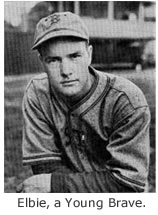 It's not that Milton hasn't had its share of sports celebrities. Among those who once called Milton home were: George Owen, of the Boston Bruins; Carl Lindquist, Carl Erskine, and one-time Most Valuable Player for the National League Bob Elliot, all of them members of the Braves (when still a Boston franchise); and, of course, the colorful pitching ace, Luis Tiant, who came to the Red Sox in 1971. But only one was a homegrown, lifetime resident: "Elbie" Fletcher.
It's not that Milton hasn't had its share of sports celebrities. Among those who once called Milton home were: George Owen, of the Boston Bruins; Carl Lindquist, Carl Erskine, and one-time Most Valuable Player for the National League Bob Elliot, all of them members of the Braves (when still a Boston franchise); and, of course, the colorful pitching ace, Luis Tiant, who came to the Red Sox in 1971. But only one was a homegrown, lifetime resident: "Elbie" Fletcher.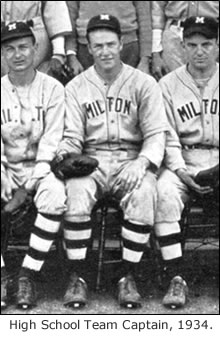 So it was that when we were kids, my Dedham cousin, Billy Barker, used to tell all his Dedham buddies that his Milton relatives live “right next door” to Boston Braves first baseman, Elbie Fletcher, and are such “close friends” of Elbie’s that they – we – could get Cousin Billy tickets to Braves games anytime he'd like. Best seats in the house, too. And, of course, all the autographed baseballs he wanted – from Elbie, Warren Spahn, Johnny Sain, Ted Williams, or any baseball great from either league!
So it was that when we were kids, my Dedham cousin, Billy Barker, used to tell all his Dedham buddies that his Milton relatives live “right next door” to Boston Braves first baseman, Elbie Fletcher, and are such “close friends” of Elbie’s that they – we – could get Cousin Billy tickets to Braves games anytime he'd like. Best seats in the house, too. And, of course, all the autographed baseballs he wanted – from Elbie, Warren Spahn, Johnny Sain, Ted Williams, or any baseball great from either league!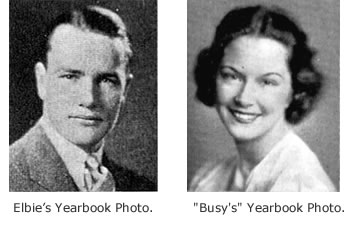
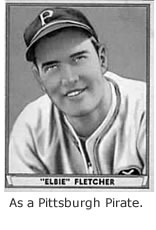 Making his major league debut with the Boston Braves at age 18, Elbie was described as “a flashy fielding, line drive hitting first baseman” who “displayed top fielding range with an excellent batting eye.” Another writer remarked, concerning his acquisition: “The Braves seemed to have a knack for finding local talent which the Red Sox somehow overlooked.”
Making his major league debut with the Boston Braves at age 18, Elbie was described as “a flashy fielding, line drive hitting first baseman” who “displayed top fielding range with an excellent batting eye.” Another writer remarked, concerning his acquisition: “The Braves seemed to have a knack for finding local talent which the Red Sox somehow overlooked.”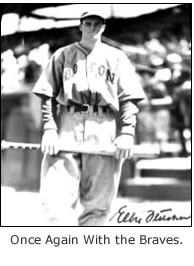 But Ruth’s fading glory wasn’t the team’s only problem that year. Despite having a flashy first baseman from Milton, the 1935 Braves were just awful, having gained the dubious distinction of being second worst team in major league history, by finishing the season an abysmal 60 games out of first place! They needed to start rebuilding.
But Ruth’s fading glory wasn’t the team’s only problem that year. Despite having a flashy first baseman from Milton, the 1935 Braves were just awful, having gained the dubious distinction of being second worst team in major league history, by finishing the season an abysmal 60 games out of first place! They needed to start rebuilding.